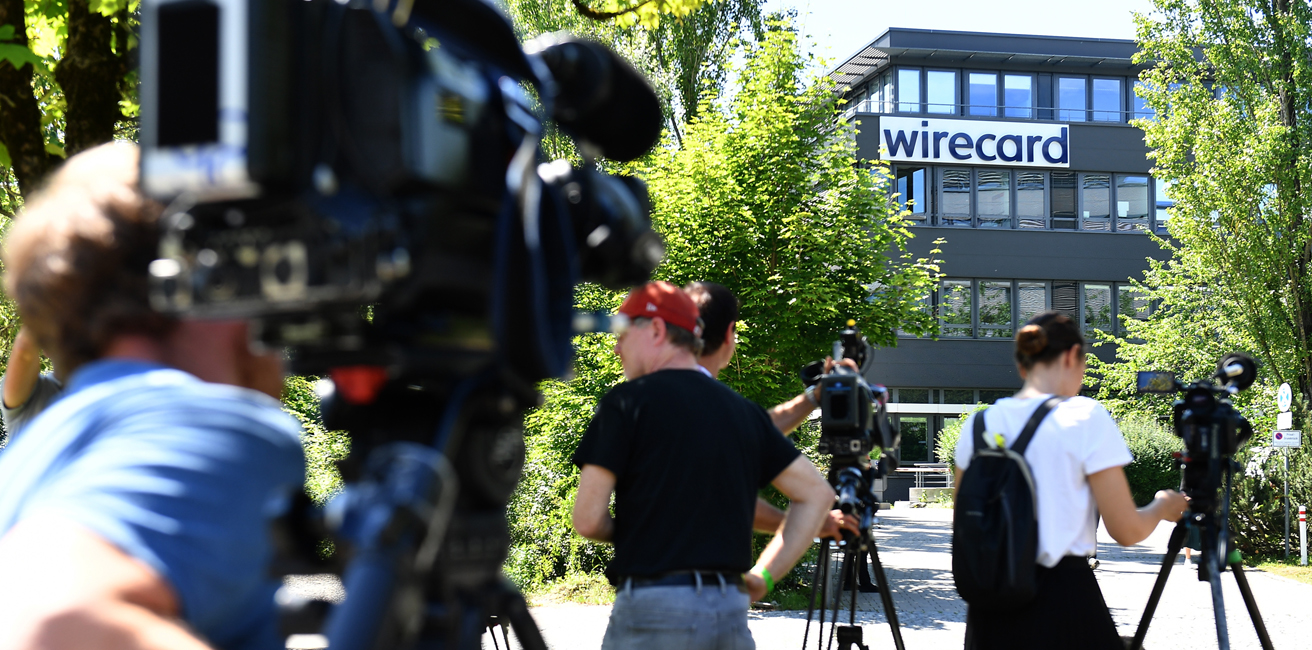Get Focus insights straight to your inbox
Steve Jobs was known for many things. Cruelty toward mediocrity; the relentless pursuit of beautiful design; and rocky family relationships all swirled around him. He also liked wearing turtlenecks. This quirky piece of clothing quickly became synonymous with his brilliance. Boy, has it been tarnished since his earthly departure.
First, it was Elizabeth Holmes, the founder of Theranos and central figure in the book Bad Blood, that saw herself fit to don the enigmatic turtleneck. She now faces up to 20-years in prison because the revolutionary blood test, on which her billion-dollar business was built, never really existed.
And now, the turtleneck has been soiled once more. Markus Braun, the ex-CEO of Wirecard, a German fintech collapsed by fraud, had a few of them in his wardrobe, too.
The fraud
Gambling and pornography. These are the two industries on which Wirecard initially forged its payments processing business. In a nutshell, their infrastructure and technology facilitate the transfer of money between merchants and their customers. Soon they moved to process payments for businesses with less moral hazard.
Wirecard’s revenue and geographic representation grew quickly under Mr Braun’s guidance. Midway through 2018, they became a constituent of the DAX 30, an index of German blue-chip companies trading on the Frankfurt Stock Exchange. But as investors clamoured for their shares, enriching Mr Braun and his cohort, the media started to dig.
Journalists from the Financial Times discovered embers of impropriety, from which smoke continued to pour. The FT’s investigation evolved into a series of dogged articles — the series was called The House of Wirecard — that eventually forced management to hire KPMG to conduct an independent audit. The aim was to clear their name. But the auditor’s investigation was mired in obfuscation and misinformation. And in the end, KPMG said they did not have the necessary evidence to exonerate Wirecard.
The cards folded and fell when a search party began looking for an elusive €1,9 billion in cash. Wirecard had been using 3rd party payment processors in territories where they didn’t have the necessary licenses to operate. They earned a commission in return and large profits were recorded through their income statement. But the cash stubbornly refused to reflect in their bank accounts.
Wirecard management claimed the money was being held in escrow accounts in the Philippines. But when those banks denied having any dealings with Wirecard, the game was up. Markus Braun was arrested shortly after Wirecard’s board admitted that the €1,9 billion, in all likelihood, never existed.

From billionaire to bail-out: Former Wirecard CEO Markus Braun
Lessons for investors
Wirecard’s share price peaked at nearly €200 per share in September 2018. At the time of writing, that number is now less than €2. It’s widely accepted that successful investors avoid losses of this magnitude. What can we learn from the Wirecard fraud to deliver us from these catastrophic investments?
Know your weaknesses
The study of human behavioural biases is now mainstream, its findings revered. Confirmation bias is one such behaviour, and in the context of investing, it works like this: Whenever we make an investment decision, we create an internal story to justify it. When information comes to light that undermines our original story, we prefer to ignore it because changing our view requires the expenditure of emotional, cognitive, and kinetic energy.
Instead, we continue to seek out information that confirms how we first saw things. Know that this is how your brain works. And when information arises that’s in opposition to your story, don’t ignore it, investigate.
KPMG failed to verify Wirecard’s revenue between 2016 and 2018 — investors should have updated their stories with that information. (Suggested reading: Thinking Fast and Slow by Daniel Kahneman)
Trust your character judgement
Homo sapiens have an uncanny ability to detect risk; it’s how we’ve survived and thrived. We’re particularly good at assessing whether we can trust someone. So, if you feel uneasy after engaging with company leadership, don’t ignore that emotion. Here are some of the more dangerous character traits to look out for in the upper echelons of company leadership:
- Evasive or vague responses to tough questions
- Aggressive or combative attitude when accused of impropriety
- Overly optimistic growth projections
When the Financial Times put forward their concerns about Wirecard, management failed to respond in a coherent and measured manner. Instead, they accused the FT of trying to manipulate their share price and threatened them with legal action. (Suggested reading: Blink by Malcolm Gladwell and The Smartest Guys in the Room by Bethany McLean)
Invest in what you know
Peter Lynch's adage is, perhaps, not specific enough. The intention of this maxim is not to have you scrutinising financial statements by candlelight. Rather, aim to understand the basics:
- How does the business make money?
- What are its major overheads?
- What industry-related regulatory risks might be a factor?
- Who manages the business and what does their track-record look like?
- Are there barriers to entry for their competition?
- What is their debt-to-equity ratio and how does it stack up against competitors?
Finding the answers to these questions will give you a good understanding of the business model. And if you know how a business works, you’ll also be attuned to the potential risks they face.
Using 3rd party payment processors, like Wirecard did, increases both the complexity and transparency of the business model as well as the associated risks. (Suggested reading: The Little Book of Common Sense Investing by John C. Bogel)
Look for cash and short interest
There’s often a difference between the profits a business reports and the cash that hits their bank accounts. The former is subject to malleable and myriad accounting standards, the latter to reality. So, look for the cash. Wirecard was undone by a large mismatch between profits (impressive) and cash (fabricated). No business can survive on profits because suppliers and shareholders can only be paid in cash.
Short interest is the total number of shares that have been sold ‘short’ by investors who expect the share price to decline. Most often, shorting shares is a thankless task. The company and its management are likely to be hostile toward you, and the public will question your morality for taking advantage of a falling share price.
There’s little motivation to take a short position beyond the belief of financial reward down the line. Also, pay specific attention to how the company responds to the concerns of short sellers. (Suggested reading: The Signs Were There by Tim Steer)

Media gathers outside the corporate headquarters of payments processor Wirecard during a raid by investigators on July 1, 2020 in Aschheim, Germany.
Lessons for fintechs
Risk management is often seen as a grudge function, especially for fledging, fast moving fintechs. It’s like taking out life insurance at a young age; you don’t really believe anything will go wrong and you’d much rather spend money on the things that matter here and now. But the Wirecard debacle is a poignant reminder of what can happen when risk management is forsaken. What can fintechs do to avoid a Wirecard-esque fate?
Start at the top
Company culture is informed by the behaviour of senior leadership. It follows that if you want employees to actively look for, and address risk, management needs to set the example. Markus Braun’s leadership style was characterised by an obsession for growth and clandestine, dictatorial decision making.
The Wirecard board, who were supposed to provide the checks and balances, did not stand in his way. You can write comprehensive rules and regulations to reduce risk, but they’ll be ineffective without leadership practicing what they preach.
Prepare for the worst
The accounts and transaction capabilities of the merchants using Wirecard’s payment processing services were frozen when the fraud became apparent. This was done to prevent money being rerouted by Wirecard to shore up their balance sheet in a last-ditch effort to save themselves.
Though the freeze was enacted to protect merchants and their customers, the inability to transact hurt merchant revenue and reputation. The lesson here is to have a contingency plan in place to ensure business continuity should a service provider become incapacitated for any reason.
Strive for independence
Business leaders tend to focus on ways to enable growth. They develop strategies to take advantage of those opportunities. It’s hard work. The result is that they prefer to avoid looking for risks that might undo their vision and efforts to reach it.
Markus Braun was one such leader. He saw risk management as a threat to the growth of Wirecard, choosing to make decisions in isolation. Therefore, it’s advisable for fintechs to have an independent risk management function.
To be sure, those appointed to manage risk must work closely with company leadership to understand their plans and the concomitant risks. But they must report directly to the board to safeguard the independence of their views.
See the potential
Fintechs initially enjoyed relative freedom from regulation when compared to the traditional banking sector. But this is changing. Regulatory demands faced by fintechs are on the rise, and a comprehensive risk management framework will be needed to navigate those choppy waters.
The ability to adapt to these regulatory changes in a timeous manner will be a competitive advantage and a bona fide revenue enabler. So, instead of approaching risk management with trepidation, fintechs should imagine how its implementation will put them ahead and get excited instead.
Watch out for turtlenecks
The fintech industry is here to stay. Low barriers to entry, the speed of innovation, and the scope for disruption will see many business models and technologies tested. Only some will prevail.
These businesses present exciting opportunities for investors. But, to avoid calamitous outcomes, they must manage their own emotions, and separate industry hype from the underlying fundamentals of the fintech in question.
For fintechs themselves, risk management must become a priority if they wish to create a culture proficient in identifying and dealing with risk. Their survival, sustainability, and success depend as much on the product or service they deliver as it does on how they manage their risk.
But whether you’re an investor or a fintech, it’s probably best to distance yourself from turtlenecks for a while.




